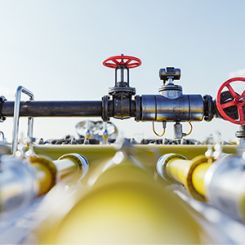
Air-operated double diaphragm (AODD) pumps are a class of positive displacement (PD) pumps featuring flexible membranes in combination with inlet and outlet check valves used to move liquids through the pumping chambers. These pumps are used extensively in transfer and metering applications typically requiring flows up to about 300 gallons per minute (gpm) or 1,150 liters per minute (L/min).
They handle liquids of varying viscosities including but not limited to: chemicals, dry powders, food additives, glues, paints, pharmaceutical products, slurries, tailings and wastewater.
The most common type is the double diaphragm pump (duplex pump), which has two pumping chambers and two flexible diaphragms. The diaphragms are connected by a connecting rod and are clamped at the outer edges of the diaphragm. Continuous reciprocating motion, along with internal check valves, creates an alternating intake and discharge of pumped liquid into and out of each chamber that results in a nearly continuous pumping action from the combined chambers.
AODD pumps have no dynamic seals or packing (sealless), are self-priming, can handle dry running, and can operate from 0% to 100% flow and pressure. Air consumption is approximately proportional to flow rate (zero air consumption at zero flow rate and maximum air consumption at maximum flow rate). This feature makes AODD pumps desirable with wide-ranging and intermittent flow requirements.
The reciprocating action supports efficient pumping of highly viscous liquids, but the inlet piping is a primary consideration to ensure reliable operation. The reciprocating action causes pressure fluctuations in the inlet and outlet piping. On the inlet side, these fluctuations can cause application and reliability issues due to liquid not filling the pumping chamber if the inlet piping is not adequately designed to accommodate peak flow.
For more information regarding air-operated pumps, refer to ANSI/HI Standard 10.1-10.5 Air-Operated Pumps at www.pumps.org/standards.

